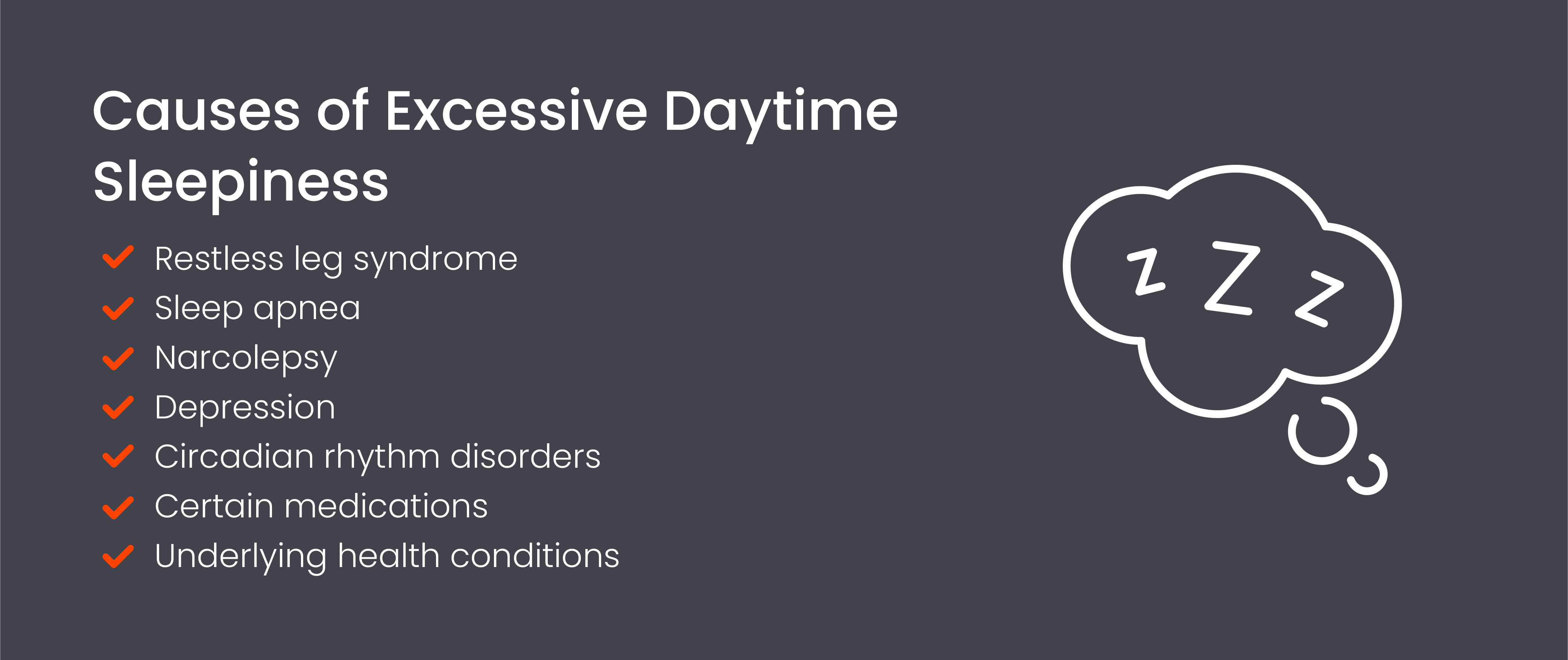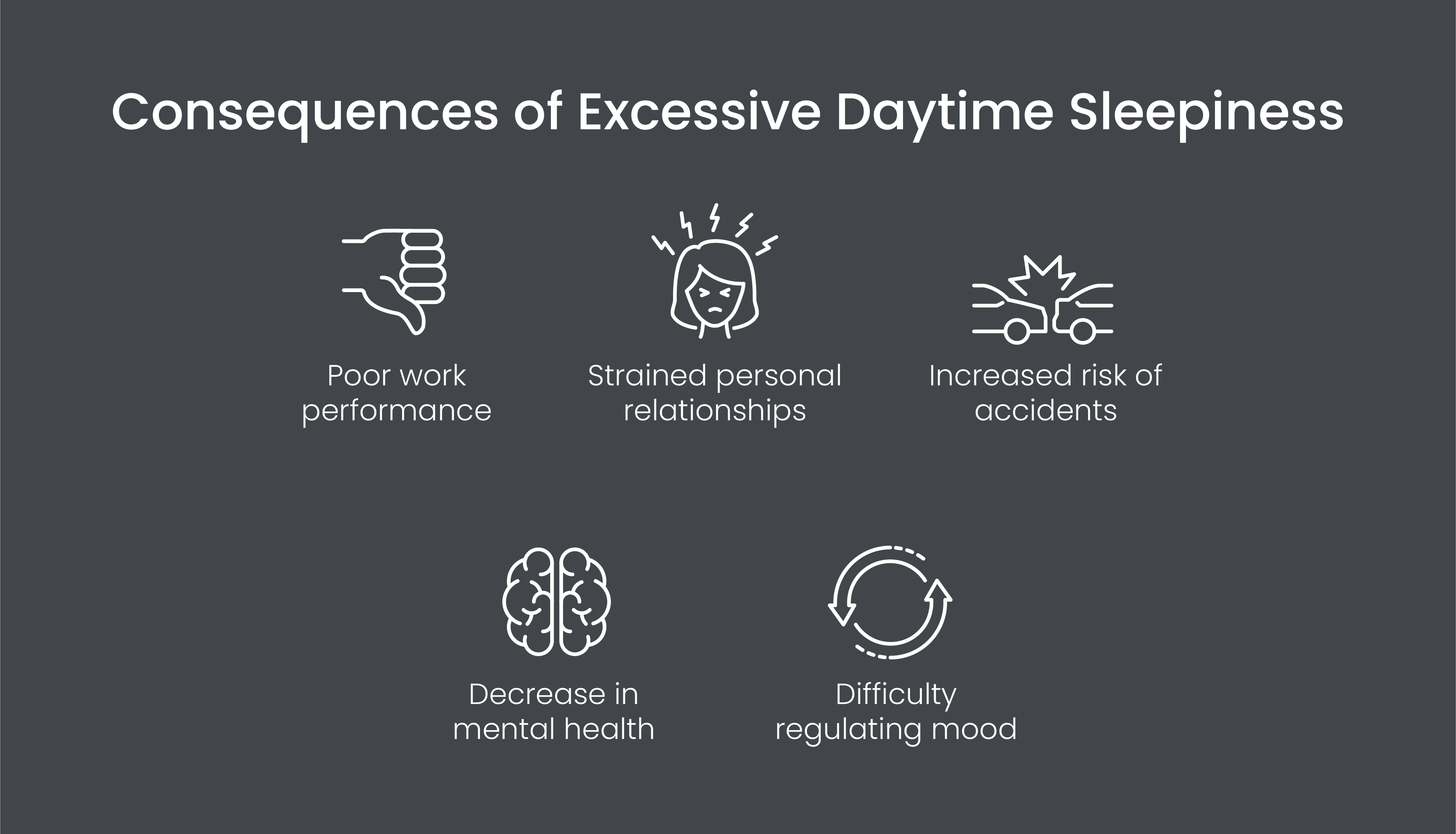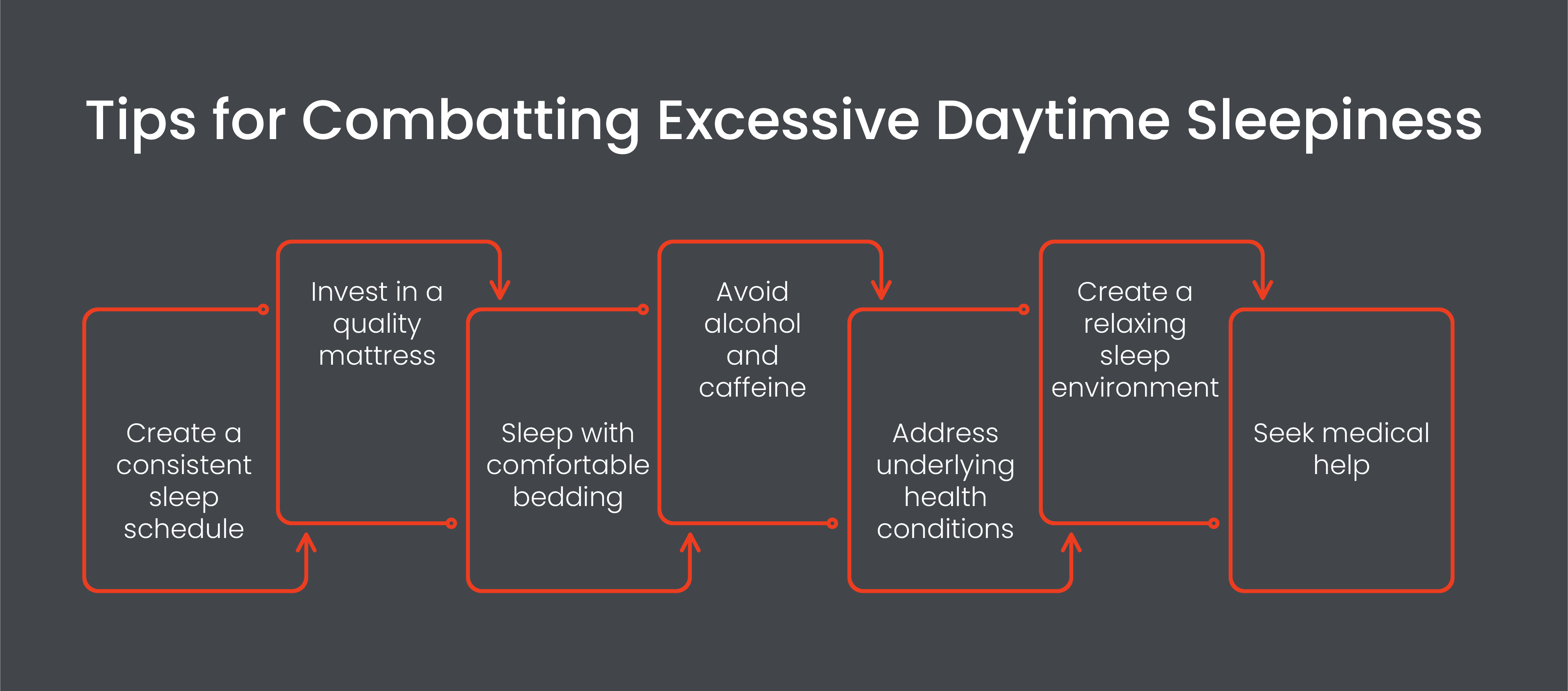What Is Excessive Daytime Sleepiness?

- What Is Excessive Daytime Sleepiness?
- What Causes Excessive Daytime Sleepiness?
- What Are the Symptoms of Excessive Daytime Sleepiness?
- What Are the Consequences of Excessive Daytime Sleepiness?
- How Can You Treat Excessive Daytime Sleepiness?
- Wrapping Up: Excessive Daytime Sleepiness
What Is Excessive Daytime Sleepiness?
Excessive daytime sleepiness, also known as hypersomnia, is a medical condition that makes you feel tired during waking hours. As a result, individuals may also sleep longer at night. It’s important to note that excessive daytime sleepiness is different from feeling tired throughout the day because you didn’t get enough sleep. For example, if you stay up too late the night before and feel tired, you’re not suffering from excessive daytime sleepiness. Instead, this condition can cause you to fall asleep during the day, and naps often don’t help you feel more awake.

Excessive daytime sleepiness is a common disorder affecting around 20% of the population. Unfortunately, this condition can be dangerous because individuals who feel sleepy during the day can fall asleep at inappropriate times, such as while driving.
What Causes Excessive Daytime Sleepiness?
Excessive daytime sleepiness is more than common fatigue. It is commonly caused by underlying health conditions and other sleep disorders, resulting in difficulty waking up in the morning, feeling tired during waking hours, difficulty thinking, and irritability or anxiety. But what conditions can cause excessive daytime sleepiness? Common causes of daytime sleepiness include restless leg syndrome, sleep apnea, narcolepsy, and depression.

Restless leg syndrome
Restless leg syndrome (RLS) causes unpleasant sensations in the legs, creating a need to move them. Individuals with restless leg syndrome may have jerking movements throughout the night, resulting in the sufferer waking up in the middle of the night. Restless leg syndrome can worsen while an individual is at rest, so it’s especially common at night and can interfere with sleep quality.
Sleep apnea
Sleep apnea occurs when someone’s upper airway becomes blocked in the middle of the night, reducing airflow. As a result, individuals with sleep apnea stop breathing and start again multiple times throughout the night. Another type of sleep apnea, central sleep apnea, is less common than obstructive sleep apnea and occurs when the brain’s signal to the muscles that control breathing is interrupted.
Common sleep apnea symptoms are snoring and gasping for air, which can wake someone up in the middle of the night. Unfortunately, many people aren’t aware they have sleep apnea because it occurs in their sleep.
Narcolepsy
Narcolepsy is a sleep disorder that makes individuals feel sleepy or drowsy during their waking hours. Ultimately, the brain can’t control someone’s sleep-wake cycles, which can cause them to experience excessive drowsiness during the day and at inappropriate times, making them fall asleep suddenly.
Individuals with narcolepsy may lose muscle control, as it causes weakness, or collapse, and these sleep attacks usually only last for a few seconds. Narcolepsy can cause other sleep disorders, such as insomnia, and mental health disorders, like depression.
Depression
Depression is another common cause of excessive daytime sleepiness because it can affect sleep quality and energy levels throughout the day. Other symptoms of depression include hopelessness, forgetfulness, and loss of concentration and overall energy. Depression can also cause physical symptoms, such as pain and GI issues.
Many people experience winter fatigue, also known as seasonal affective disorder (SAD) or winter depression, due to a lack of sunlight and physical activity during the cold, dark season. Sunlight is crucial for regulating your circadian rhythm and affects mental health.
Depression can lead to sleep problems and sleepiness, but sleep issues can also lead to depression, so it’s sometimes impossible to determine which came first. In addition, many types of sleep disorders are associated with depression, including insomnia, sleep apnea, and RLS.
Additional causes of excessive daytime sleepiness
Other medical conditions can cause excessive daytime sleepiness, including cancer, pain, obesity, and hypothyroidism, because they affect your ability to get quality sleep. In addition, certain medications can contribute to sleepiness and fatigue as a side effect. If you’re having difficulty getting quality sleep, you may need to consult your doctor.
What Are the Symptoms of Excessive Daytime Sleepiness?
Apart from feeling tired during waking hours, individuals may experience the following excessive daytime sleepiness symptoms:
- Trouble staying awake during the day
- Irritability and anxiety
- Issues with thinking, focusing, and memories
- Difficulty learning
- Slower reaction times
- Risk-taking behaviors
What Are the Consequences of Excessive Daytime Sleepiness?
Most people have experienced excessive sleepiness throughout the day due to a variety of causes. For example, new parents often have sleep interruptions throughout the night as their babies cry. Meanwhile, college students may pull all-nighters to study for a test, resulting in sleepiness the next day. The consequences of excessive daytime sleepiness are similar to extreme fatigue due to sleepless nights, but they’re often more severe. Common consequences of daytime sleepiness include:

- Poor work performance: Excessive daytime sleepiness results in issues with memory, focusing, and decision-making, which can ultimately impact your work performance. This disorder can also cause you to fall asleep at inappropriate times, such as during an important meeting or at your desk in the middle of the day.
- Strained personal relationships: Individuals suffering from excessive daytime sleepiness may experience irritability that impacts their relationships. Additionally, their drowsiness can make it difficult to enjoy everyday activities, such as spending time with friends and family. In most cases, these individuals are overtired and won’t feel like doing anything except trying to sleep.
- Increased risk of accidents: As we’ve mentioned, individuals with excessive daytime sleepiness can fall asleep at inappropriate times, including when operating heavy machinery, like when driving a vehicle or working in a factory.
- Decrease in mental health: Daytime sleepiness can affect your overall mental health, resulting in anxiety and depression. Meanwhile, mental health issues can also cause daytime sleepiness and interfere with sleep quality.
- Difficulty regulating mood: Sleep helps you regulate your mood. When you’re tired, you’re more irritable and can lash out at others. Excessive daytime sleepiness can cause emotional and mood problems, making it more challenging to control your emotions.
How Can You Treat Excessive Daytime Sleepiness?
Treatment for excessive daytime sleepiness depends on the cause. For example, if an individual with excessive daytime sleepiness has depression, mental health providers will aim to treat the depression to alleviate the excessive sleepiness during the day. Another way you can treat excessive daytime sleepiness is by improving your sleep quality. If you suffer from this sleep disorder, here are a few things you can try:

- Create a consistent sleep schedule: Having a regular sleep schedule can help train your body and mind to go to bed and wake up at a certain time every day. Depending on your current sleep schedule, getting used to a new one can take some time. However, eventually, your body and mind will respond, getting tired around the same time every day.
- Invest in a quality mattress: A bad mattress can drastically affect your comfort levels, even causing pain in some cases. If your mattress is old or has lumps and bumps, it can put your body in an unnatural alignment that causes pain while you sleep and after you wake up. The wrong mattress for your sleeping position can also affect your ability to fall asleep and stay asleep.
- Sleep with comfortable bedding: Comfortable and cozy bedding is crucial. Most of us can’t sleep without having a blanket on top of us. However, sleeping with the wrong bedding can result in overheating throughout the night, and no one likes waking up in a pool of their own sweat. Instead, consider changing your bedding with the seasons. For example, switch to thicker and heavier blankets during the winter and breathable and lightweight fabrics during the warm summer months.
- Avoid alcohol and caffeine: Alcohol and caffeine interfere with the stages of sleep. Caffeine gives you an energy boost that can last for hours, while alcohol can make you feel tired and sluggish, affecting your circadian rhythm. Individuals may think alcohol helps them sleep better because it makes them fall asleep, but it can make you wake up multiple times throughout the night.
- Address underlying health conditions: Many underlying health conditions can affect sleep, including obesity, diabetes, and restless leg syndrome. Addressing your underlying health conditions by talking to a doctor and finding the right treatment is crucial. However, keep in mind that some medications used to treat underlying health conditions can make you feel fatigued throughout the day, so it’s essential to be aware of potential side effects.
- Create a relaxing sleep environment: A relaxing sleep environment will ensure you can fall asleep and stay asleep. Your bedroom should be dark and cool to help your body and mind relaxed. If too much light comes through your window, consider getting blackout shades. Meanwhile, you might benefit from a sound machine if you have noisy neighbors.
- Exercise more: Exercise can improve sleep quality by helping you expel excess energy while improving your mood to help you feel calmer when you hit the sheets at night. However, be mindful of when you work out because exercise before sleep can affect your ability to fall asleep.
- Seek medical help: Excessive sleepiness throughout the day can be a symptom of a serious underlying health issue. Talk to your doctor if your sleepiness won’t go away and you get enough quality sleep every night.
Wrapping Up: Excessive Daytime Sleepiness
Excessive daytime sleepiness is a common disorder affecting memory and decision-making skills. It can also lead to dangerous accidents if you’re not careful. Unfortunately, many people don’t realize that their mattresses could be to blame for poor sleep quality. Investing in a quality mattress can help you get the sleep you need to improve your performance at work and maintain healthy relationships.
Get better sleep and fight excessive daytime sleepiness with Layla’s memory foam and hybrid mattresses. Our mattresses are designed to keep you cool and comfortable all night long to promote better, healthier sleep.





